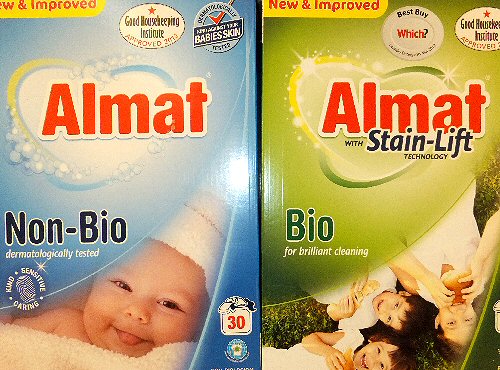Bio or Non-bio washing powders?
Note: these articles have been published in The Mole, the supplement to Education in Chemistry produced by The Royal Society of Chemistry.
Bio or Non-bio washing powders, J. P. Hare, The Mole, Education in Chemistry, issue 9 May, 2013.
click here for article PDF

When you buy washing powder there are generally two types to chose from: 'biological' and 'non biological'. Why do we need two types and what exactly is the difference?
Grease and dirt
Grease and other types of dirt are generally organic matter which is not very water soluble. These are hard to remove from clothes simply by washing in clean water. That's why we need soap.
Non biological powders
Soap and other cleaners can be made by reacting fats with alkalis - soap is a salt of a fatty acid (triglycerides). A typical soap is sodium stearate; a molecule having a long organic 'tail' and an ionic 'head'. When soap and water is added to the washing the 'tail' of the soap molecule is drawn to the organic grease while the ionic 'head' interacts with the water. The result is that the soap acts as a bridge between the insoluble grease and the water. The soap very effectively removes the dirt and grease from the clothes forming spherical micelles (foam) in the process which can be washed away. Soap-based washing powders such as these are called 'non-biological' washing powders.
Enzymes and biological powders
Many modern washing machine powders however also contain enzymes. Enzymes are biological catalysts which play a wide, varied and incredibly important role in all living things. They are large molecules (usually proteins) whose three-dimensional structure determines their function. Many drugs and poisons work by inhibiting enzyme function.
Enzymes can be used commercially for example in the synthesis of antibiotics as well as in biological washing powders. When added to washing powders they greatly enhance the breakdown of proteins and fats in our dirty cloths. The enzyme-based cleaners are called 'biological' washing powders.
The enzymes work well in warm water rather than a 'hot wash' so they save us energy. In the early days clothes washed in the enzyme-based powders sometimes caused irritation for people with sensitive skin conditions. That's why brands of enzyme-free, 'non biological', powders are still produced.
However, now that enzyme-based powders have been around for many years most of the potential irritants have been identified and removed so the biological products should not create problems for the great majority of people. Many countries now only produce biological powders but in the UK both types are still available.
How they compare
Recently BBC Radio 4's 'You and Yours' programme broadcast a programme on Biological and Non Biological washing powders [1]. Their resident scientist, Dr Mark Lorch, suggested a nice experiment to show the effectiveness of the enzyme: pieces of hard boiled egg (which are mainly protein) were added to solutions of the two washing powder types. Left overnight, the non-bio cleaner didn't do very much, however the enzyme-based biological cleaner made the fragments smaller and clearly attacked the egg fragments [1].
Notes
[1] BBC4 radio web-site "consumer confusion" Part 1 - bio & Non Bio washing powder, 3rd December 2012
.......................
THE CREATIVE SCIENCE CENTRE
Dr Jonathan Hare, The University of Sussex
Brighton, East Sussex. BN1 9QJ.
home | diary | whats on | CSC summary | latest news
